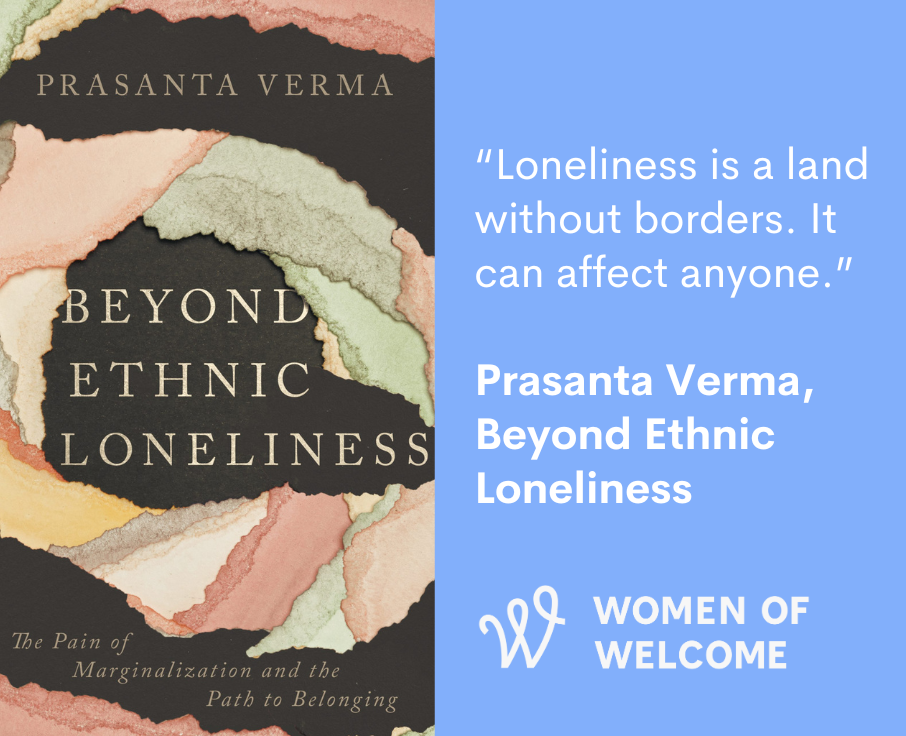Have you ever felt like an outsider in your own home?
For many immigrants, refugees, and people of color in America, this isn’t just a fleeting feeling—it’s a constant reality. In her groundbreaking book Beyond Ethnic Loneliness: The Pain of Marginalization and the Path to Belonging, Prasanta Verma takes readers on a journey through the often invisible yet deeply felt experiences of ethnic and racial loneliness.
If you are someone in the majority culture, it can be challenging to fully grasp the depths of ethnic and racial loneliness. However, as human beings, we have all felt the sting of loneliness at some point, enabling us to approach this topic with empathy and compassion.
Growing up as an Indian American immigrant in the deep South, Prasanta Verma knows firsthand the realities of ethnic loneliness – from cultural isolation and alienation to oppression and public discrimination. She carried this sense of being “other” and yearned for a place of true belonging.
Her family’s journey to the United States began with the passage of the 1965 Immigration and Nationality Act, which opened doors for more immigrants from Asia and Africa. At the time, the U.S. was seeking individuals with specific educational backgrounds, and Prasanta’s father, a doctor, met these criteria. This act has since played a significant role in transforming the demographic landscape of the United States.
They first settled in South Dakota, but after a few years of enduring the harsh cold and snowy weather, Prasanta’s family wanted to move to a warmer climate. Their search led them to a small town in Alabama that needed a doctor. Prasanta’s parents loved the location, the close-knit community, and the local schools. However, they soon realized they were the only Indian immigrants within a 40-mile radius.
“There were people who were very welcoming and kind and wanted us there, but then there were also people who didn’t want us there,” Prasanta remembers. “I grew up going to a small school, and there was nobody else like me, nobody else that looked like me, except my sister. I grew up not having anyone who could understand what it was like to be in this immigrant family, to be South Asian, to have parents who had a different cultural experience.”
Throughout her life, Prasanta often found herself as the sole minority in predominantly white spaces. However, it was during the 2016 election, eight years ago, that she felt most isolated. The political climate and societal discussions about immigrants and foreigners had intensified. As an immigrant, Prasanta felt deeply affected by these conversations and pulled in at a different level than she had experienced before.
“Even though I was a U.S. Citizen and felt secure in that, all of a sudden I no longer felt secure,” recalls Prasanta. “All of that just drove this idea of me feeling so isolated and feeling like an outsider in a different way. Not just personally in my environment, but also in a political sense, feeling like I, I was being othered, and somebody was telling me that I didn’t belong here.”
Amid this sense of disconnection, Prasanta was inspired to write her book. Drawing from her own experiences of personal trauma growing up in white Southern culture and the impact of the current political and social climate, Prasanta felt compelled to address ethnic loneliness. She recognized that she was not alone in these experiences and knew she needed to include other perspectives and stories in her book.
“I wrote a survey and sent it out,” explains Prasanta. “I wanted to get firsthand stories and perspectives from other immigrants, so it wasn’t just my own stories. I wanted to hear from people with different backgrounds and people from other racial and ethnic groups. That was part of my learning, but also part of the sharing and understanding, because, even though there are things that are common to us as ethnic minorities, there are also unique things about each of us.”
Prasanta believes sharing these stories and the exhausting effects of cultural isolation, will help those experiencing racial and ethnic loneliness find the words to describe their struggles and realize they are not alone. Additionally, those who have not experienced it firsthand will better understand its impact, fostering more empathy, safe friendships, and supportive communities.
“When ethnic minorities are not part of community and are unable to partake in the give-and-take of living in relationship, both sides suffer and community cannot flourish.”
—Prasanta Verma, Beyond Ethnic Loneliness
Through her work, Prasanta invites readers to transform places of exile into spaces where immigrants can find true belonging with themselves, others, and God.
We had the incredible privilege of interviewing Prasanta and diving deeper into her story as well as the role the Church can play in bringing healing to racial and ethnic loneliness. We are excited for you to get to know Prasanta and join us in learning how to help others move from isolation to connection. This is the first of three short videos in our summer blog series. Check it out and help us shine a light on this topic!

 This resource answers the most common questions Christians have about immigration and equips you to engage conversations with biblical clarity, truth, and grace.
This resource answers the most common questions Christians have about immigration and equips you to engage conversations with biblical clarity, truth, and grace.